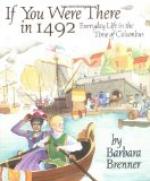Licentiousness of settlers.
The account which Guacanagari gave to Columbus, and which there seems no reason to doubt, is, that the Spanish who had been left at La Navidad took to evil courses, quarrelled amongst themselves, straggled about the country, and finally were set upon, when weak and few in numbers, by a neighbouring Indian chief named Caonabo, who burned the tower and killed or dispersed the garrison, none of whom were ever discovered. It was in Caonabo’s country that the gold mines were reported to exist, and it is probable that both the cupidity and the profligacy of the colonists were so gross as to draw down upon them the not unreasonable vengeance of the natives. Guacanagari, the friendly cacique, who had received the admiral amicably on his first voyage, declared that he and his tribe had done their utmost in defence of the Europeans, in proof of which he exhibited recent wounds which had evidently been inflicted by savage weapons. He was, naturally, scarcely so friendly as before, but communication with him was made easy by the aid of one of the Indians whom Columbus had taken to Spain, and who acted as interpreter. Guacanagari was willing that a second fort should be built on the site of the first, but the admiral thought it better to seek a new locality, both because the position of the old fort had been unhealthy, and because the disgusting licentiousness of the settlers had offended the Indians to such an extent that whereas they had at first regarded the white men as angels from heaven, now they considered them as debased profligates and disturbers of the peace, against whom they had to defend their honour and their lives.
Colony founded at Isabella.
Sailing along the coast of Hayti, Columbus selected a site for his projected settlement, about forty miles to the east of the present Cape Haytien. This he called Isabella, after his royal mistress. Here the ships of his squadron discharged their stores, and the Spaniards laboured actively in the construction of the first town built by Europeans in the New World. But the work did not progress prosperously. Diseases prevailed among the colonists. The fatigues and discomforts of a long sea voyage were not the best preparations for hard physical labour. The number of men which the admiral had brought out with him was disproportionate to his means of sustaining them. Provisions and medicines began to fail. And, worst of all, none of the golden dreams were realized, under the influence of which they had left Spain. Only small samples of the precious metal could be procured from the natives, and the vaguely indicated gold mines of Cibao had not been reached. Anxiety, responsibility, and labour began to tell upon the iron constitution of the admiral, and for some time he was stretched upon a bed of sickness.
Columbus despatch to the court of Spain.




